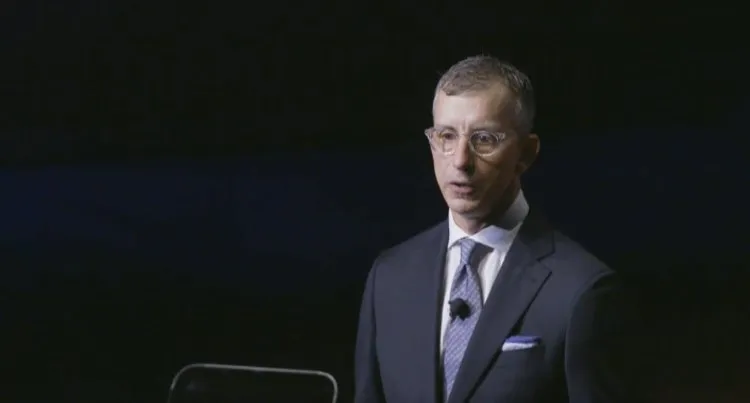National Music Publishers’ Association President & CEO David Israelite speaking at the NMPA Annual Meeting in June in New York (Photo: Digital Music News)
Apple didn’t contest a massive royalty rate increase for music publishers and songwriters. But that doesn’t make them the good guys, according to the National Music Publishers’ Association (NMPA).
Up until this point, we’d thought that Apple was an ally of music publishers and songwriters. But major music publishers would beg to differ.
Last month, Digital Music News questioned whether National Music Publishers’ Association president and CEO David Israelite had mistakenly lumped Apple into a group of streaming music bad actors during a speech to NMPA members. During the NMPA Annual Meeting in New York last month, Israelite trotted out some interesting stats about streaming music payouts to music publishers — while tossing Apple under the bus.
“There are 47 different music services that operate 151 different models that pay mechanical royalties to songwriters. We now know that in 2021, those services combined generated nearly $9.8 billion in revenue, which is just one of the important factors by which songwriters get paid,” Israelite disclosed to NMPA members.
“The vast majority of those royalties, over 96 percent, come from the same five companies that are fighting to cut songwriter rates in the CRB process: Amazon, Spotify, Apple, Google, and Pandora. We also now know that those services paid record labels $5.7 billion in 2021, 58.6 percent of the revenue pool – significantly higher than the 52 percent that is often reported.”
And yes, Israelite has subsequently confirmed that Apple is among the streaming giants’ fighting’ music publishers and songwriters.
When major streaming music rivals Spotify, Amazon Music, Google, and Pandora contested a massive royalty-rate increase issued by the Copyright Royalty Board in 2018, Apple refused to join. But according to Israelite, that doesn’t make them the good guy — just less of a bad guy.
Confirming that his statement on Apple was “not an error,” Israelite told Digital Music News that Apple’s behavior across multiple rate periods has been less-than-exemplary. “This line from my remarks was referring not just to the appeal of Phono 3 but also the proposals for Phono 4,” Israelite clarified. “Apple’s proposal in Phono 4 includes significant cuts from the current rate structure through new discounts and reductions in what constitutes the revenue pool.”
Just to clarify, Apple never contested the significant 43.8% rate increase issued by the CRB for the period of 2018-2022 (which falls under the ‘Phonorecords III’ designation). But Israelite accused Apple of riding on the coattails of the other litigants, while stopping short of crafting direct deals to increase rates permanently.
“Apple did not join the [Phonorecords III] appeal, although they will get the same benefit as those who did appeal since Apple is no longer doing direct deals above the statutory rate and thus will pay the same statutory rate as all the others,” Israelite continued. “The comment about them trying to cut the rate refers to Apple’s proposal in CRB 4 where they are asking for big cuts in what the rate is today.
“To be fair, Apple’s proposal in CRB 4 is not as bad as Spotify and Amazon’s proposals. But they are still seeking cuts.”
In the wake of a decision upholding the massive royalty increases, major streaming platforms like Spotify and Google (which owns YouTube Music) are attempting to delay their retroactive payments to music publishers. We’re not aware of Apple making similar requests, however.
Whether Spotify and its band of appellants will succeed in delaying past-due payments remains unclear. But looking ahead, the NMPA is now battling over royalty rates for the current period of 2023-2027 (which falls under ‘Phonorecords IV’). Whether Apple chooses to fight publishers in the current proceeding is also speculative, though the company may reflect on its inability to garner praise from major publishers during the previous round.
Apple Music often enjoys a reputation for being more artist-friendly than rivals like Spotify.
Since its inception, Apple Music has been paid-only, a decision that dramatically improves artist payouts per stream. A major driving force behind that decision was Jimmy Iovine, who is credited with pursuing a more artist-friendly approach than other streaming platforms.
Iovine was absorbed into Apple as a co-creator of Beats by Dre, which Apple acquired in a deal valued at more than $3 billion.

